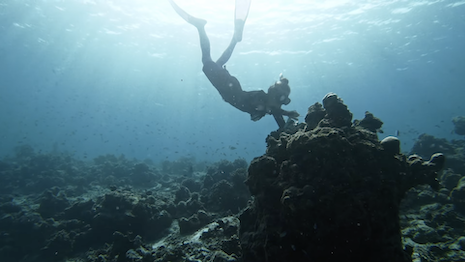 After two years of marine biologist-led reef studies, a documentary is now out detailing the compiled findings, entirely filmed at the Landaa Giraavaru reef. Image credit: Reefscapers
After two years of marine biologist-led reef studies, a documentary is now out detailing the compiled findings, entirely filmed at the Landaa Giraavaru reef. Image credit: Reefscapers
Luxury hospitality group Four Seasons is making waves in oceanic research.
The brand’s Maldives locations have been hosting coral research and conservation efforts for two years, teaming up with biologists from local marine consultancy Reefscapers to build coral frames. After years of studying asexual coral propagation, scientists in the Maldives have released a documentary of their compiled findings, entirely filmed at Four Seasons Landaa Giraavaru’s coral reef.
Spawning change
The documentary entitled A Coral Spawning Journey: Research, Reproduction, and Resilience is one of the rare visual records of coral breeding, placing Four Seasons on the cusp of modern marine science.
The film is set at Four Seasons Landaa Giraavaru resort, situated on a UNESCO Biosphere Reserve wilderness. The brand’s Kuda Huraa Maldives location is also a research site for the Reefscapers and Four Seasons, jointly calling themselves the Marine Savers.
The essential research is explained, from 96-hour lab processes to underwater coral spawning
The marine biologists involved at both sites have created frames on which to grow and propagate coral, instigating coral breeding that can spread the structures off-frame and into the rest of the atoll. The effort at Landaa Giraavaru is specifically shown in the documentary, showing a process that few have heard of, let alone ever witnessed.
Guests staying on-site are invited to dive in, the sites opened up to observation as an educational push concerning the critical cause.
Saving the ocean is not just a choice, it's a duty we owe to our planet and future generations. In Kuda Huraa, the @marinesavers team and our guests participated in cleaning the ocean to ensure a safe environment for the marine life.#fsmaldives #cleantheocean #sustainability pic.twitter.com/fmhceSySNx
— Four Seasons Resorts Maldives (@FSMaldives) May 4, 2023
Rising seas threaten the very existence of the Maldives themselves, making coral reef conservation an especially beneficial cause for resorts that call the islands home, including Four Seasons.
Reefs like the ones on the Four Seasons reserve protect the low-lying islands from harsh waves that cause devastating erosion and shrink the shoreline by acting as a buffer to break the fall of the water. By the time the waves roll to the beach, the water is calmed and does not eat away at the land.
However, as sea levels rise in the warming climate, that buffer is becoming less effective.
The environmental emergency increases the number of severe storms every year, which destroy the infrastructure of the reef systems and beachside hotels.
Climbing temperatures are also spiking water temperatures, causing what is known as “coral bleaching” to the reefs, turning them into white, skeletal, brittle structures.
View this post on Instagram
Coral reefs are alive, made up of colonies of animals called corals. According to Reef Savers, while only covering 1 percent of the planet’s surface, reefs support 25 percent of all marine biodiversity.
They die as the water gets too warm, putting not only locals and Maldivian species at risk, but the resort industry on the islands in jeopardy as well, including Four Seasons.
As a result, resorts in the Maldives are facing shrinking property and beach areas, shortened tourist seasons due to worsening storms and among other things, the loss of a longtime tourism asset, coral reefs.
Luxury tourists want to see rainbow-hued corals, brimming with life and species they have never seen before, not underwater graveyards of white branches, not a fish in sight. Worldwide, the options for this market to have this experience are shrinking.
From a pioneering coral regeneration partnership to impactful manta research, to turtle rehabilitation, reforestation efforts and energy conservation, these are just some of the ways we invest in our planet.#earthday2023 #earthday #investinourplanet #sustainability pic.twitter.com/oP9eVREqow
— Four Seasons Resorts Maldives (@FSMaldives) April 22, 2023
Under the Endangered Species Act, two coral species are listed as being endangered and 22 coral species are threatened.
In 2016, a mass bleaching event caused more than 90 percent of all shallow reefs in the Maldives to die, per the documentary. Reefscapers have begun to work with natural spawning as well as the asexual method that propagation involves in order to ensure genetic diversity and disease resilience as the stocks dwindle.
This forward-thinking approach is explained by researchers in the documentary, giving viewers a window into the future of oceanic preservation science.
"Sea-ing" education through
As Four Seasons is among those relying on coral reef-seeking tourists for profits, the company’s Maldives resorts are not only hosting research efforts.
The Landaa Giraavaru location has a marine discovery center, run by on-site biologists. The space provides education on turtle rehabilitation, manta ray conservation, fish breeding and the coral project.
Four Seasons has been centering environmental learning opportunities in nature-forward properties around the world, including in Hawaii (see story).
On safari-style outings, guests can additionally learn about the land and sea that is hosting their Maldives vacation alongside experts. Sea turtle swims, dolphin cruises and reef snorkeling all provide a hands-on alternative to indoor education, an approach the brand has tried out in other landscapes such as the mountains of Yellowstone National Park in the United States (see story).